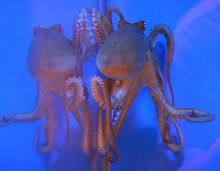 Picture this: I go into a school to substitute teach. Someone in the office makes a gesture to show me which way the class is. I walk out of the office. A moment later, the person calls to me that I'm going in the wrong direction. Seems like I'm not paying attention, huh? Ah, no. A slight change in direction can disorient me. I can't look back and see the person who was doing the pointing -- there's now a wall separating us -- and so the gesture the person was making no longer has any meaning whatsoever to me. I can't place the gesture in in its proper orientation in space, I can't place the person in her proper orientation in space, and very likely I can't tell you which way which way the desk in the office was facing. I can still tell you where the office is -- I can still see the door if I turn around. But give me another minute, and a couple more turns, and I won't be able to where the office was. (I mean, where it is -- I know that things do have fixed locations in space, even though the world seems, spatially, "Just like a maze, where all of the walls all continually change".)
Picture this: I go into a school to substitute teach. Someone in the office makes a gesture to show me which way the class is. I walk out of the office. A moment later, the person calls to me that I'm going in the wrong direction. Seems like I'm not paying attention, huh? Ah, no. A slight change in direction can disorient me. I can't look back and see the person who was doing the pointing -- there's now a wall separating us -- and so the gesture the person was making no longer has any meaning whatsoever to me. I can't place the gesture in in its proper orientation in space, I can't place the person in her proper orientation in space, and very likely I can't tell you which way which way the desk in the office was facing. I can still tell you where the office is -- I can still see the door if I turn around. But give me another minute, and a couple more turns, and I won't be able to where the office was. (I mean, where it is -- I know that things do have fixed locations in space, even though the world seems, spatially, "Just like a maze, where all of the walls all continually change".)Yes, there are moments when that contributes to making a bit of a bad impression, or having some management troubles. Kindergartners, unlike, say, fourth graders, may be so meek that they won't tell me which way to walk down the hall even when I ask them to. But if we have to turn around ("Why are we going this way?") to correct a mistake, there may be some little issues. ("He got in front of me!" "I was there!")
Most of us aren't homing pigeons, but there are neurons that fire in our brain to help us record locations and find our way back. A normal human (like a normal mouse) will also show an ability to form cognitive maps or neural representations of place. They don't have to walk a path in a particular direction to understand it from that direction. And yet that ability can be missing -- even when cognitive/ reasoning skills are intact.





